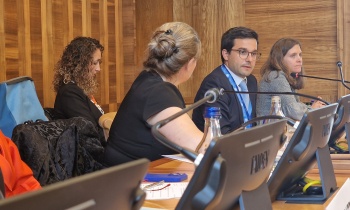At the Human Rights Council: Renewed Calls for Independent Human Rights Monitoring at International Borders

At the 60th session of the Human Rights Council, attention turned once again to the urgent need for stronger human rights monitoring in migration governance.
On 25 September 2025, QUNO co-hosted a side event to launch the new report of the Office of the United Nations High Commissioner for Human Rights (OHCHR) on human rights monitoring in the context of migration and build on previous side events on this topic. Opening the discussion, Peggy Hicks of the OHCHR underlined the urgency of collective action: “We must do more, and we must do it together.”
The OHCHR report on human rights monitoring highlights how migrants face serious protection gaps at borders, including pushbacks, arbitrary detention, profiling and violence. A proactive monitoring process of collecting, verifying, and analyzing information to identify and prevent human rights violations in migration are needed to prevent these violations, strengthen accountability, and uphold States’ obligations to protect the rights of all people on the move.
The report makes clear that monitoring is not an end in itself. Its ultimate purpose is to document violations, identify patterns and causes, and drive systemic change. Yet access barriers, lack of independence, and insufficient resources continue to hinder effective oversight. The report’s final recommendation calls on the Human Rights Council to support the strengthening of independent monitoring at international borders, including consideration of an international mechanism supporting the call from over 250 NGOs.
Speakers at the side event pointed to the role of States, national human rights institutions, and civil society in ensuring that monitoring is systematic and effective. Closing remarks from Mexico stressed that governments must cooperate with monitors and act on their findings.
In response to this report QUNO Geneva also delivered an oral statement, reminding the Human Rights Council that since 2015, more than 70,000 people have died or gone missing in migration. Highlighting that these lives were lost because rights were not protected. The statement urged the Council to act on OHCHR’s recommendation and support an international monitoring mechanism:
“Robust, independent monitoring is essential, not only to document violations, but to prevent them, to uphold dignity, and to save lives… Ten years from now, let us not look back on another decade of preventable deaths”
QUNO has consistently advocated for such a mechanism. Our briefing paper, Human Rights at International Borders: The Need for an International Monitoring Mechanism (available below), outlines four guiding principles for its creation, and proposes a structure and envisioned functions. It demonstrates how an independent mechanism, mandated by the Human Rights Council, could enhance both prevention and accountability, while ensuring follow-up action at national, regional, and international levels.
QUNO will continue to work with civil society, UN partners, and States to advance this agenda. From joint letters signed by hundreds of organizations to oral interventions, to practical proposals, the message is consistent: monitoring at borders saves lives. We look to the Human Rights Council to turn recommendations into action.


